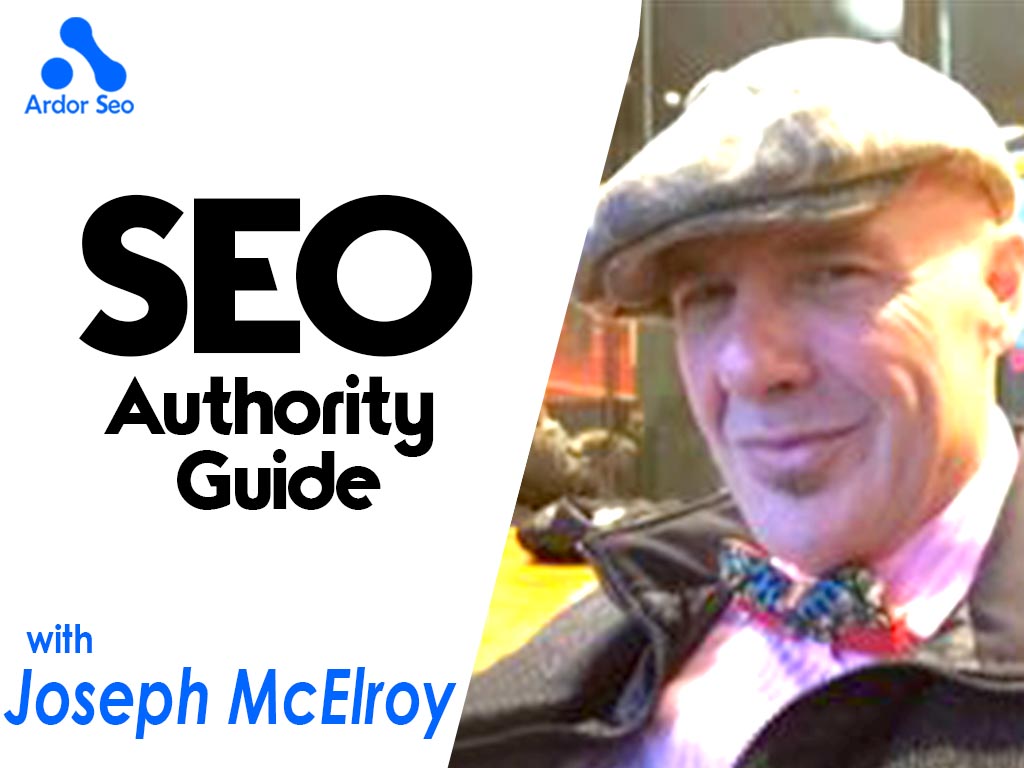
By Joseph McElroy, CEO of Galileo Tech Media
http://galileotechmedia.com/
I was recently in Mexico for one of those all-inclusive resort long weekend getaways, and was pleasantly surprised by the amount of organic fare available. (This post is not about food, though if you want to hear about a fantastic 12-course feast, we can talk later!) This post is actually about how I got there, and some thoughts on the state of Search Engine Optimization for travel.
CAN ORGANIC POSSIBLY AND PROFITABLY GROW?
This section is supposed to scare you into thinking about the dire state of things, paving the way for me to ride in like a white knight and show you the Holy Grail. I’m supposed to start by saying, “SEO is dead” - and then show you how it’s actually not. So let’s get that over with quickly, so that we can get to the good stuff.
Not too long ago, the CEO of Priceline set the travel industry was abuzz when he said the following about SEO:
“As far as SEO is, my view on that is it’s more of a desktop thought because as the devices get smaller and smaller and smaller, the number of choices from an SEO perspective on mobile decline dramatically. And so I believe it is a paid world. Google is an advertising engine and they drive paid traffic to advertisers. And I think that’s going to continue for quite some time. We will do our best to play in that environment.”
You might be asking yourself what the heck he’s talking about. Well, take a look at the results for my first search on Cancun:
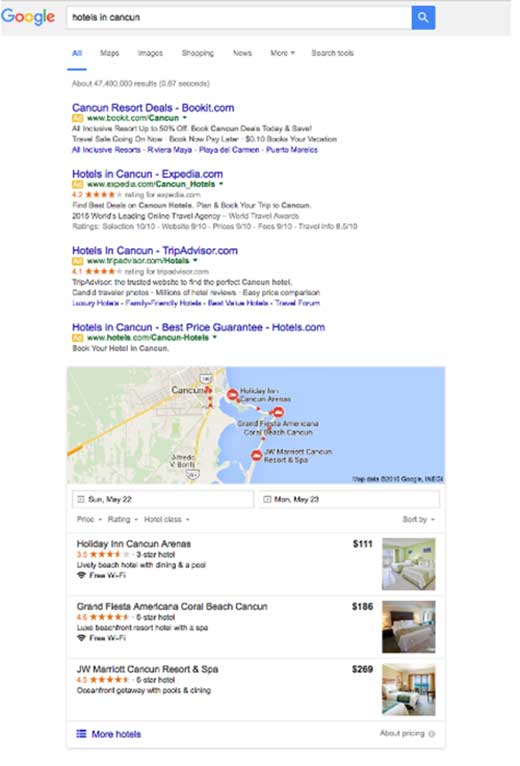
As you can see, all the results are paid or part of Google’s Travel product. Tada – the death of SEO in the travel industry!
But wait, wait! Why is the travel industry getting left out of the global growth of SEO? Very smart people are saying that SEO marketing will grow from $65B today to $80B by 2020.
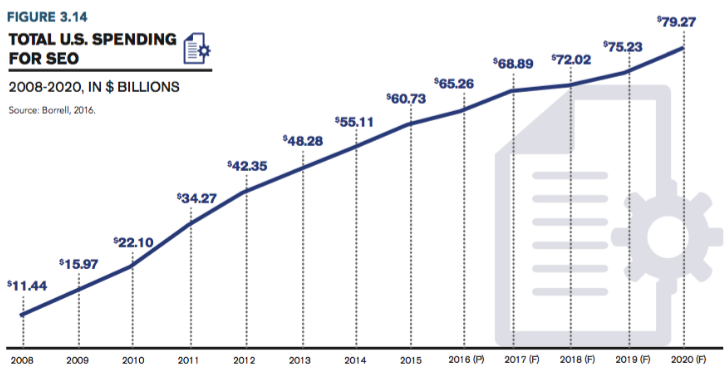
The answer is pretty simple. Search Engine Optimization won’t disappear anytime soon, and the travel industry is going to continue to use it as a critical part of its marketing strategy. But what is happening is that SEO is continuing to become more dynamic, with a different strategy for every type of search, and more fundamental, becoming a support system for every other type of marketing.
THE DYNAMICS OF ORGANIC
In the beginning, Alan Ematge created search, and saw that it was good. Format-less and devoid of content, but good. Other search engines came along and search engine results pages started showing content with page titles. This, too, was good, and SEO was created to influence those results. Eventually Google came upon the Earth and introduced ads to those search results pages. These were still simple pages, and SEO was still focused upon the simple list of results.
Fast forward to today, and you’ll find that search engine result pages have morphed dramatically into hundreds of combinations involving many types and features.
These types of search include:
- Global Search
- Local Search
- Image Search
- Video Search
- News Search
- Shopping Search
- Mobile Search
- Maps Search
- Apps Search
- Books Search
- Flights Search
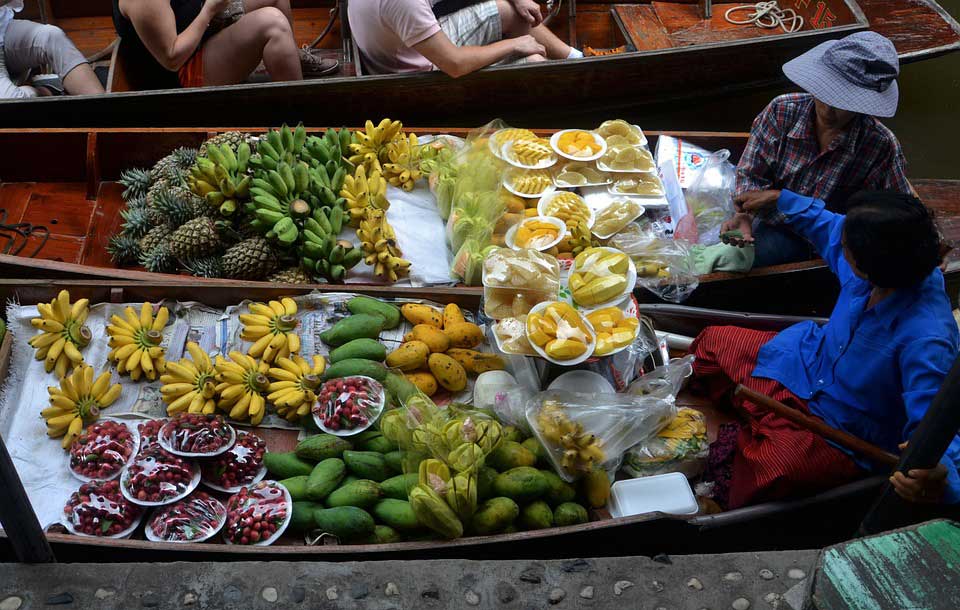
The features that might be included on a page:
- Answer Boxes
- Currency Conversion
- Dictionary
- Disambiguation
- Flights
- General Converter
- Information
- Map
- Nutrition
- Related Questions
- Sports
- Stock
- Translation
- Weather
- When Is - Knowledge Panel
- Local Packs
- News Boxes
- Related Searches
- Featured Snippet
- Carousel (Black)
- Carousel (White)
- Breadcrumbs
- Events
- HTTPS
- Image Thumbnail
- Notable Online
- Reviews (Stars)
- Search Box
- Site Links
- Video Thumbnail
- Autocomplete
When I was searching for my Mexican vacation, I searched for many terms. When I asked what all-inclusive resorts were, I got a "featured snippet" that told me. Imagine if this result had linked to a good hotel site instead of Wikipedia? Next, I did some research on the Riveria Maya, but accidentally searched for "Rivera Maya Resort" - and found Grand Velas, both in the first Google Hotel results and #3 in the natural results. I started taking them very seriously. Various other searches, including “resorts mayan riviera all inclusive” produced a significant branding impression for me. I ended up booking that resort.
Many of those searches included advertising. I mostly ignored them, because they were booking sites, not information sites. And many of my longer searches did not produce ads at all – for example, "what is near riviera maya".
This is what I want you to consider – only 39% of search results pages have ads! That means that over 60% of 1.2 trillion searches per year feature NO ADVERTISING!
It is not a question of whether you should do SEO – it’s just a question of how to do it with a positive return on investment. Part of the answer is treating every variation of search and feature above as a separate SEO strategy with a well-thought-out approach.
SUPPORT SYSTEM FOR ORGANIC GROWTH
Those same smart people who projected $80 billion in SEO by 2020 also say that SEO represents 87.5% of the Online Marketing Support in their pie chart for Digital Marketing Support Spending.
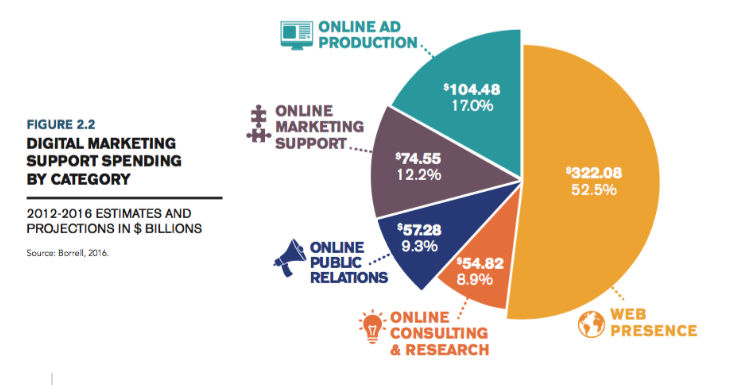
SEO is now seen as necessary component of everything you can possibly do to market online. A February 2015 poll by Econsultancy showed that 73% of in-house marketers said SEO provided excellent or good return on investment. It supports traffic, conversions, authority, and reputation. You can get great insights into your prospect and customers from analytics driven by SEO traffic. SEO practices make your website better, your content richer, and your measurement smarter. And it requires you to incorporate many important practices into a corporate culture to effect successful online marketing. These include:
- Flatter and more responsive organizations
- Better communication channels
- Healthy community connections
- Efficient execution habits
- Executives who "get it"
- Corporate pride
ORGANIC CONCLUSION
Clearly, I believe SEO is still a key component of your travel marketing plans. The death of SEO in general has been predicted since 2005, and a new story comes out every year. Data from Priceline's own site contradicts the assertion of its CEO. Local Search Optimization is becoming more important for brands like hotels and car companies. Google’s increasingly complex algorithms mean that content needs to evolve and be wiser. If you are not growing organically, you are not achieving a healthy marketing campaign.

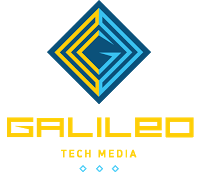
Joseph McElroy is a technology and inbound marketing expert who understands it takes much more than “words” to enhance a brand. It takes wise words, wise content. Joseph possesses the depth that allows him to live and breathe a brand, and realizes the emotional and psychological elements of marketing. Joseph’s experience with big-data tools, inbound marketing strategy and implementation, and all the ins and outs of wise content development have brought him in contact with some of the top brands in the world.
You can find out more at: Galileo Tech Media
https://www.facebook.com/galileotechmedia
https://twitter.com/GalileoTech
https://www.linkedin.com/in/josephmcelroy
https://www.linkedin.com/company/9210230
Galileo Tech Media

